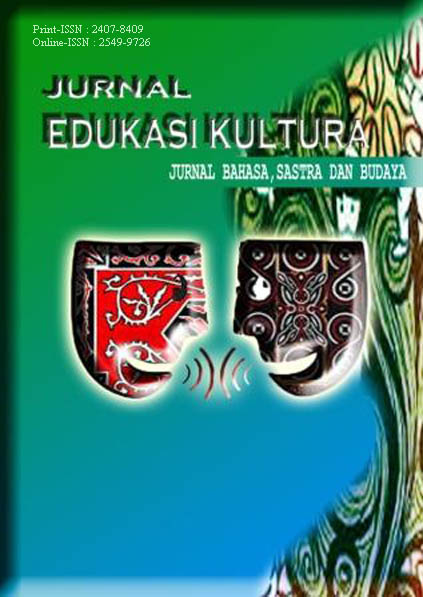PENGARUH MODEL PEMBELAJARAN MASTERY LEARNING TERHADAP HASIL BELAJAR BAHASA INGGRIS MATERI “PARTS OF OUR BODY THAT WORK TOGETHER” KELAS 5 SDN
DOI:
https://doi.org/10.24114/edukasikultura.v12i1.65620Abstract
This study aims to determine whether there is an effect of using the Mastery Learning model on English learning outcomes for the material "Parts of Our Body That Work Together" for grade V SDN. This research was conducted at the UPT SPF SD NEGERI 104206 Jalan Pendidikan I, Sei Rotan Village, Percut Sei Tuan District, Deli Serdang Regency, North Sumatra in the even semester of the 2024/2025 academic year. This study uses experimental research with Quasi-Experimental (quasi-experiment) and uses Nonequivalent Control Group Design as the research design. The number of samples is 40 students who are determined using the total sampling technique. The results of the study were obtained by the paired simple t test with a significance value of 0.001 <0.05. And the results of the effect size test obtained the Cohen's d value in this study was 5.319, meaning that the Cohen's d value > 1. Based on these results, it can be concluded that the use of the Mastery Learning learning model has an influence and provides a high effect on the learning outcomes of English for the material "Parts of Our Body That Work Together" in class V of SD Negeri 104206 Sei Rotan.References
Azizah, F. N. (2021). Pengaruh Penggunaan Model Pembelajaran Mastery Learning (Belajar Tuntas) Terhadap Hasil Belajar IPS Kelas VII Di MTS Miftahul Ulum Suren Ledokombo Jember Tahun Pelajaran 2021/2022. In Skripsi. Universitas Islam Negeri Kiai Haji Achmad Siddiq Jember.
Byslina Maduwu. (2016). Pentingnya Pembelajaran Bahasa Inggris Di Sekolah. Jurnal Warta, 4(Oktober), 1–7.
Herawati, N., Syarifuddin, U., & Husain, H. (2022). Pengaruh Model Pembelajaran dan Gaya Belajar terhadap Hasil Belajar Peserta Didik. Chemistry Education Review (CER), 5(2), 170.
Laia, B., & Zai, E. P. (2020). Motivasi Dan Budaya Berbahasa Inggris Masyarakat Daerah Tujuan Wisata Terhadap Perkembangan Bahasa Anak Di Tingkat SLTA (Studi Kasus: Desa Lagundri-Desa Sorake- Desa Bawomataluo). Jurnal Education and Development, 8(4), 602–608.
Larasati, Z., Hartatik, S., Nafiah, & Widiana Rahayu, D. (2020). Pendekatan Mastery Learning: Peningkatan Hasil Belajar Pembelajaran Matematika Siswa Di Sekolah Dasar Mastery Learning Approach: Improving Students’ Mathematical Learning Outcomes in Elementary School. Auladuna: Jurnal Pendidikan Dasar Islam, 7(2), 136–144.
Megawati. (2019). Meningkatkan Kreativitas Tematik Siswa Dengan Penjumlahan Pengurangan Menggunakan Pendekatan Mastery Learning Kelas II SD Negeri 065853 Medan Denai. ESJ (Elementary School Journal), 9(1), 76–86.
Mirdad, J. (2020). Model-Model Pembelajaran (Empat Rumpun Model Pembelajaran ). (Indonesia Jurnal Sakinah) Jurnal Pendidikan Dan Sosial Islam, 2(1), 14–23.
Sri Annisa, I., & Mailani, E. (2023). Analisis Faktor Penyebab Kesulitan Siswa Dalam Pembelajaran Tematik Dengan Menggunakan Metode Miles Dan Huberman Di Kelas IV SD Negeri 060800 Medan Area. INNOVATIVE: Journal Of Social Science Research, 3(2), 6469–6477.
Suandi, I. W. (2019). Implementasi Model Pembelajaran Mastery Learning Untuk Meningkatkan Prestasi Belajar Bahasa Inggris. 26, 409–421.
Downloads
Published
How to Cite
Issue
Section
License
Copyright (c) 2025 Rahmat Efraim Silitonga, Albert Pauli Sirait

This work is licensed under a Creative Commons Attribution 4.0 International License.

This work is licensed under a Creative Commons Attribution 4.0 International License
Authors who publish with this journal agree to the following terms:
- Authors retain copyright and grant the journal right of first publication with the work simultaneously licensed under Creative Commons Attribution 4.0 International License that allows others to share the work with an acknowledgement of the work's authorship and initial publication in this journal.
- Authors are able to enter into separate, additional contractual arrangements for the non-exclusive distribution of the journal's published version of the work (e.g., post it to an institutional repository or publish it in a book), with an acknowledgement of its initial publication in this journal.Penulis.
- Authors are permitted and encouraged to post their work online (e.g., in institutional repositories or on their website) prior to and during the submission process, as it can lead to productive exchanges, as well as earlier and greater citation of published work (Refer to The Effect of Open Access).



